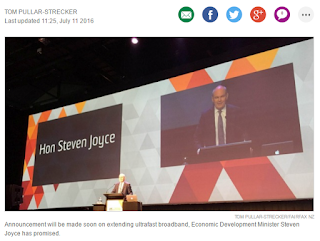On the week that I finished
my last Mindlab assignment the Ministry of Education announced formal changes
to the New Zealand curriculum that would see digital technologies recognised as
core curriculum. I glowed with satisfaction for a brief time at feeling ahead
of the game, or at least on the game given the intensive professional
development that I had received over the last six months in leadership,
collaboration and change alongside digital technologies. The glow faded rapidly
as I read more about this announcement.
"Digital
technology will be formally made part of the New Zealand Curriculum - the first
change since 2007.
Education
Minister Hekia Parata said the change would prepare school students for a
future in which "digital fluency" would be critial.
The
change is a recommendation of the Government's science and society strategic
plan "A Nation of Curious Minds".
"The
information technology sector is one of the fastest growing sectors in New
Zealand, with a demand for skilled graduates. This step will support young
people to develop skills, confidence and interest in digital
technologies," Ms Parata said.
Schools
can already teach digital technologies, it has now been formalised as part of
the curriculum.
Consultation
will be held until the end of the year, to design new curriculum content, with
changes fully integrated into the New Zealand Curriculum for next year."
(Jones, 2016)
The Herald article by Jones
sees the Minister of Education, Hekia Parata acknowledge the critical place of
digital fluency for our children while in Wellington at the ITx Conference Ian
McCrae, Ian Taylor and Frances Valintine (founder of Mindlab) released an open
letter criticising the scope of changes to the digital technology curriculum,
the time frame and the linking of digital technology with vocational subjects.
They stated that '.. our children will continue to be educationally
disadvantaged and underskilled for high paying tech jobs." (The Herald,
5-7-16)
Duncan Garner goes on to
describe New Zealand as having 'an analogue education in a digital
world'.
The glow fades faster. It
appears that the decision to include digital technology as a strand within the
current technology curriculum is a bitter pill to swallow for many who are
passionate about providing New Zealand students with a quality digital
technology education. The source of outrage is the failure to provide digital
technology with the status of a core subject or discipline like maths.
Underpinning this is a value system that places subjects on a hierarchy with
maths at the top and vocational subjects such as sewing, cooking and woodwork
down the bottom in terms of status. This is dinosaur thinking surely? I have
always been outraged over the artificial status given to different curriculum
areas that demean one subject at the expense of elevating another.
Digital fluency is just as
important as being fed, clothed and housed. They are all fundamental to successful
lives.
Garner, D.
(2016) http://www.stuff.co.nz/technology/81884876/duncan-garner-an-analogue-education-system-in-a-digital-world,
Retrieved 11th July, 2016
Jones, N. (2016)
http://m.nzherald.co.nz/nz/news/article.cfm?c_id=1&objectid=11668961,Retrieved
11th July 2016
Pullar-Strecker, T. (2016)
http://www.stuff.co.nz/business/industries/81963241/row-over-curriculum-dominates-opening-of-tech-conference
Retrieved 11th July, 2016.


No comments:
Post a Comment